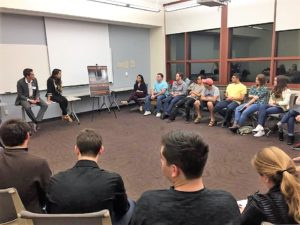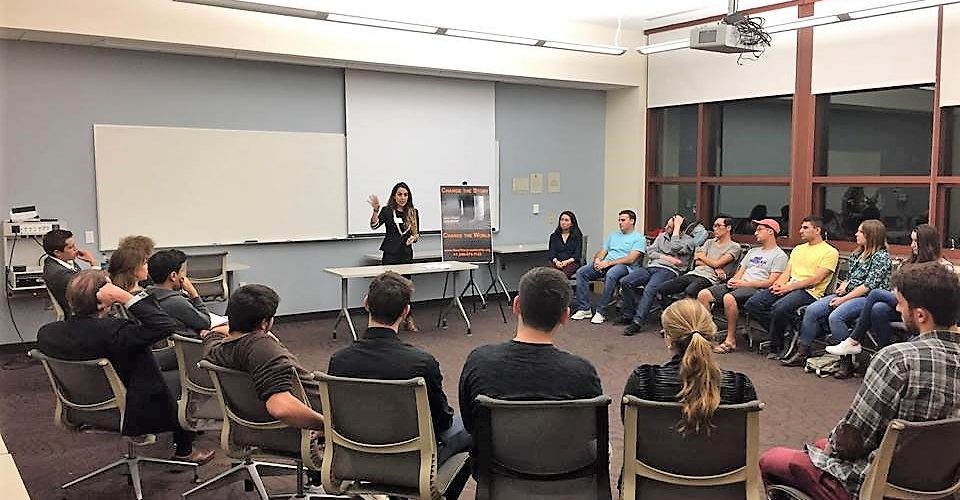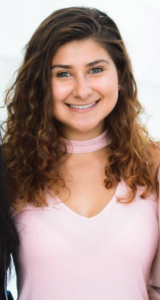Event Reflection By Sophie Levy
I have always been intrigued by those that seek to not only understand but befriend their so-called “Other.” So, when I heard of the co-sponsored event by Hillel and New Story Leadership (NSL), a non-profit organization that empowers the voices of young Israeli and Palestinian leaders to promote the possibility of peace in the Nation’s capitol, I knew I had to attend. Two NSL fellows, Rawan Odeh and Yonatan Belik spoke on their experiences that motivated them to become agents of change.

Rawan, our Palestinian representation, began the event with her story. She explained that while she was just miles apart from Israelis in her six years of living there, she never spoke to one until attending a leadership conference in England. Rawan and the Israeli she met, Rotem, both shared their perceived history of Israel and Palestine, and realized the two stories were biased, victimized, and entirely different from each other. “How could two people from the same area have such different ideas of their history?” Rawan exclaimed. The girls became close friends, and upon leaving the conference, they swore to see each other again, regardless of the hurdles that confronted them. This proved more difficult than expected. Rawan attempted to attend Rotem’s birthday party in Haifa, but was rejected by Israeli authorities at the West Bank, though she had no criminal regard. If Rawan couldn’t go out of the West Bank, perhaps Rotem could go in. As Rotem drove closer, her GPS began to beep violently, shouting, “Danger! Danger!” Even the GPS had the preconceived notion that Israelis and Palestinians are safer separated.
Just when it seemed all modes of connection had failed, Rawan applied for and attended a Model UN conference in Tel Aviv. Although she was able to enter Israel, she underwent intense security checks and humiliating strip searches. But the journey proved worth it. This conference coincided with Passover, and Rawan attending her first Seder with Rotem’s family. Eventually, the million-dollar question was asked: “Rawan, where are you from?”
“Palestine.”
Rotem’s family did not turn her away but welcomed her into their home and hearts. Especially Rotem’s grandmother, a Holocaust survivor. As Rawan listened to her story, she realized it paralleled with similar stories she’d heard from Palestinian grandmothers. In that moment, she discovered the shared human connection of pain, a realization that only further motivated her to engage in relationship-building through dialogue. Rawan simply stated, “How will we ever solve anything if we don’t talk?”
Yonatan too valued the effectiveness of engagement. He shared his story of a trip to Ramallah to celebrate the breaking-of-the-fast of Ramadan with a host through Seeds of Peace. As a multicultural individual, he diminished his Israeli identity and exposed his Australian one in order to impersonate a tourist in his travels. Upon his arrival, he bonded with a seven-year-old girl named Layla. They kicked a ball back and forth for a time until the ball, unfortunately, collided with water, spilling it all over the floor. Recognizing a moment for potential connection, Yonatan asked Layla if she knew the word for water in Hebrew, as it closely resembled the Arabic version. Layla’s eyes grew dark and cold.
“I don’t care. An Israeli soldier killed my best friend.”
Woah. At the end of the evening, Layla would not even hug him goodbye. Although he left the evening physically intact, his mind was damaged by this interaction. How could he move Israelis and Palestinians forward into peace instead of holding onto the scars of the past?
He enrolled at Hebrew University. It became apparent that while the school consisted of both Palestinians and Israelis, each spoke, studied, and socialized with their respective group. His Australian identity again spoke to him. Australian football was used to relieve racial tensions through sport, so why not try it here? Since both parties were unfamiliar with the game, there was no pre-established power dynamic or hierarchy, and it allowed the opportunity for two groups to grow and learn together. So, Yonatan showed up at school in his short-shorts and t-shirt uniform, ball in hand, and a determination to get these students to engage.
He kicked the ball to one side.
“No, no, pass it to him,” he tells an Israeli student, pointing to a Palestinian onlooker. A confused Arab receives the ball, “pass it across!” Yonatan yells. Suddenly, for the first time, he saw the potential for relationship-building, for human connection.
Soon, a team formed at the university. One day at practice, Yonatan noticed an interested observer. An interested ultra-orthodox observer. Seeing potential in this shy, Yeshiva student, Yonatan engaged him,
“Come over and join!”
A shake of his head informed Yonatan that this would prove more difficult than expected.
Yonatan addressed him again, “What’s your name?”
“Mordecai.”
Soon, the entire team of both Palestinians and Israelis alike were shouting “MORDECAI! Come play, come play, COME PLAY!”
Eventually, he did. After hours of learning and laughing together, the practice was over. It ended with the singing of the team’s anthem in not one, not two, but three languages: Arabic, Hebrew, and English. The team, eager to engage more players, asked Mordecai for his contact information.
“I don’t have a phone.”
Alright. “Facebook?”
Nope. Instagram, WhatsApp, Snapchat, Twitter, all no-goes.
“Alright Mordecai, we practice the same time every week, be here Monday.”
The team had little faith that Mordecai would show up. Not only was he the first one there, but he brought a friend from his ultra-orthodox community to join. The team now consisted of Secular Israelis, Orthodox Israelis, and Palestinians all playing together, regardless of their messy past. The team just returned from its third international tournament in Europe, and Mordecai continues to play the game.
These stories are an inspiration and an example of what peacemakers and movers should strive to do. Their impact gives us a lesson, now we must craft the legacy. I was given the opportunity to ask both Rawan and Yonatan a question. I explained that as an American, I often feel I have no right to address the issues of Israel and Palestine, as I am a citizen of neither. While I am a Jew, how can I comment on the demands of a country I don’t serve or struggle for? Their reply resonated with my passions: “Americans should facilitate on every level. You have been given a unique role as the mediator. You must start the conversation as an unbiased party propelled by your curiosity.”
And that is what I intend to do. As an International Relations major focusing on peace mitigation and intercultural, interpersonal communications, I strive to be an engager, seeking opportunities for human connection.
A member of the National Story Leadership Board, Joyce Schwartz, commented at the end. Her words repeat in my mind as I reflect on this evening:
“People get trapped in failing stories of the past. You must change the rhetoric…
for if we can change the story, we can change the world.”
Sophie Levy
Sophie Levy is a sophomore intern for the Center for Israel Studies and co-manager of Student Israelity. She is from Memphis, Tennessee and an International Relations and Economics major with a focus in the Middle East and Arabic language. Her passions lie in peace negotiation, refugee empowerment, and interfaith, intercultural, and interpersonal dialogue in the Middle East.




Beautiful! Thank you for giving me such a vivid glimpse into this important gathering.
Thank you! I hope you come back to our blog for more insightful posts! – From Sophie Levy.